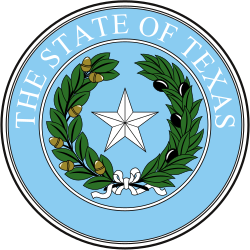November 30, 1869 | |||||||||||||||||||
| Turnout | 58.52% | ||||||||||||||||||
|---|---|---|---|---|---|---|---|---|---|---|---|---|---|---|---|---|---|---|---|
| |||||||||||||||||||
 County results [2]
| |||||||||||||||||||
| |||||||||||||||||||
| Elections in Texas |
|---|
 |
The 1869 Texas gubernatorial election was held to elect the governor of Texas. Incumbent Governor Elisha M. Pease, who had been appointed by military governor Philip Sheridan, did not run for re-election. Edmund J. Davis defeated former Governor Andrew J. Hamilton narrowly.
The election was one of the most turbulent and controversial in Texas history. Favoritism by the military for Davis over Hamilton caused Governor Pease to resign on September 30. General J.J. Reynolds ordered the drawing up of a new voter registration list, eliminating many of those who had qualified in 1867. Troops stationed at the polls probably prevented many Democrats from voting, only about half of the registered white voters actually cast a ballot, and many polling places were either not opened, or ordered closed. Irregularities were reported but never investigated, and official returns reported that Davis won by slightly less than 800 votes. [3]
Davis' narrow victory exemplified the tenuous hold Republicans had on the state even in the early stages of Reconstruction, indicating that their time in power likely would not last long. [4] This was the last election for governor of Texas won by the Republican Party until 1978; both candidates were nominally members of the party, with Hamilton being a Unionist and former Democrat and Davis being a Radical Republican.

